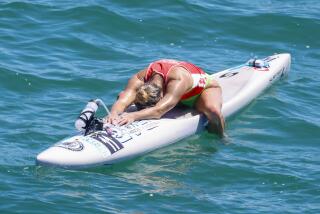Winkel Gets Help in Criterium Win
- Share via
SAN DIEGO — Glen Winkel of San Francisco and Martin Graf of Encinitas began the Open Criterium for riders 30 and over, the final race during the Masters World Cup of Cycling Championships, as competitors.
With a lap to go they became teammates.
“We didn’t plan it, or anything,” Winkel said.
“It was this that did it,” Graf said, pointing to a patch on Winkel’s jersey that spelled out the jersey-maker’s name. Graf has the same sponsor.
“And I knew the company big wigs were in town,” Graf said, “so I had to make sure one of us would get to the podium.”
There was one problem: After more than 40 minutes of racing, the field was still intact with a lap to go. And although Graf and Winkel were one-two heading into the final turn, unless Graf somehow blocked the rest of the field, there would have been at least 20 cyclists elbow-to-elbow sprinting for the finish line.
“It would have been total mayhem,” Winkel said.
The only way to block that many riders, Graf decided, was to let one guy go ahead.
Winkel then became the benefactor as Graf made a wide turn, allowing the second-place rider to slip through on the inside. Once Winkel took the initiative, Graf closed the door by moving toward the inside and kept the sprint from happening.
Winkel went on to victory in 46 minutes 37 seconds.
Evan Teske was able to sprint by Graf on the final straight-away and finished second. Graf was third.
It was the third race of the day for Winkel, who also placed third in the 30-39 age division criterium earlier in the day, then was sixth in the 30-39 in-line skating criterium.
“You use the same muscles in each sport,” Winkel remarked. “I thought it wouldn’t matter too much, but it does. My legs hurt .”
It would have appeared, then, that the other cyclists, by refusing to embark on breakaways, played into Winkel’s hands. But the truth is that most of the riders were in the same position, having pedaled through several events during the weekend.
“Guys just didn’t want to push themselves,” Winkel said. “But still, it was a steady, hard and fast pace.”
Despite his sore legs, Winkel, 37, had an advantage over the rest of the field. He’s a research scientist who concentrates his studies on the cardiovascular system. He credits the lab work he did while obtaining his degree with sparking his interest in cycling, a sport he began at the age of 26.
Suffice it to say, he didn’t want to end up like any of the cadavers he worked with.
“Most of them had heart problems,” he said.
But the link between science and cycling didn’t end there. After his victory, Winkel talked more like a researcher than an athlete, using terms like free-radicals and anti-oxidants.
Putting them into context, Winkel knew enough to counteract his body’s over-production of free radicals, which inhibit the rejuvenation of over-worked muscles, by ingesting anti-oxidants, vitamins in laymen’s terms.
Just don’t ask him how many vitamins he takes.
“I don’t want to say how much,” he said. “It’s a lot.”
More to Read
Go beyond the scoreboard
Get the latest on L.A.'s teams in the daily Sports Report newsletter.
You may occasionally receive promotional content from the Los Angeles Times.








